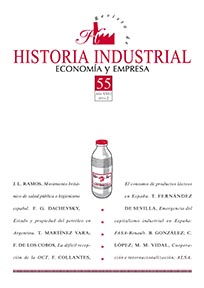The emergence of industrial capitalism in Spain: The three-pronged investment in FASA-Renault, 1965-1974
Keywords:
Development, Industry, Big Firm, Automobile, SpainAbstract
The aim of this paper is to describe the path followed by FASA-Renault within the dynamics of industrial capitalism. The hypothesis defended is that FASA-Renault was able to make the three-pronged investment defined by Chandler as a key factor for the industrial success of a large enterprise. In addition, the article considers that the development of FASA-Renault was made possible by the continued transfer of resources and capabilities by Renault. The period under analysis goes from 1965 to 1974, that is, from when Renault became the main partner of FASA until the outbreak of the oil crisis and subsequent stagflation. At that time, FASA-Renault was the thirteenth largest industrial company in Spain and had confirmed its position as the second manufacturer in the Spanish automobile industry.
Downloads
Downloads
Published
How to Cite
Issue
Section
License
We have been applying a Creative Commons Attribution license (CC-BY) since 2019, before that year we had a partial open access policy, which included open access for the first two months after publication, followed by an embargo policy for non-subscribers, as access to the last 4 published issues was restricted to journal subscribers. In contrast, early-view articles were always open access prior to publication in an assigned volume. Until 2024 the access to the last 4 published numbers was restricted to those who were subscripted to the journal.
The author assigns all rights to the publisher. Creative Commons
The author who publishes in this journal agrees to the following terms:
- The author assigns all intellectual property rights exclusively to the publisher for the entire duration of the applicable intellectual property rights. The University of Barcelona holds the copyright ownership of the contents published in the journal.
- The publisher will distribute the texts under the Creative Commons Attribution License, which allows others to share the work, provided that they acknowledge the authorship, its initial publication in this journal, and the conditions of the license.





